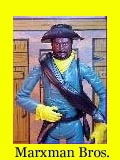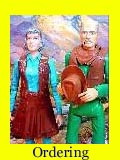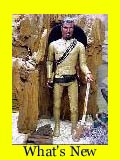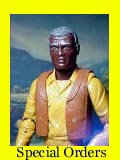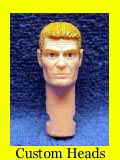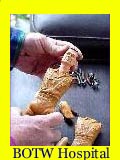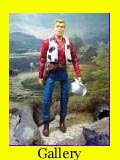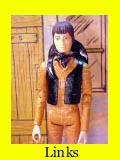
|
A civil war story based
on Noah Coop's custom figure Corporal
Samuel Cooper Author's
Note:
“Next stop, Forrrrrt Scottttt,” said the conductor in the characteristic singsong of railroadmen. “Bout damn time,” said Samuel’s seatmate. The man’s voice surprised Samuel. It was the first thing he’d said since boarding the train. The man pushed his battered porkpie hat from over his eyes and stretched. “Name’s Cate. How bout you?” “Samuel Cooper.” Cate leaned back and laughed. His teeth were very white against his black face. “Y’all sound like a city boy. Dress like one too. Whatcha doing headin to the fort?” Samuel winced at the sarcasm, but heard kindness in the voice. Survival as a black man in 1862, required that Samuel be a quick and accurate judge of a situation. He decided he liked Cate. “I’m from City of Kansas. I’ve lived there all my life. I’ve come to Fort Scott to join the 1st Kansas Colored Volunteer Infantry Regiment to fight for freedom for the slaves and equality for all men,” said Samuel. He straightened a bit and felt proud. Cate burst into laughter. Great bellowing gales of laughter. “Gonna join up and be a freedom fighter. A regular nigger Abe Lincoln. Yor mama must be proud boy,” said Cate as he wiped tears from his eyes. Samuel decided he’d judged wrong about Cate and stood up to leave. However, his haughty departure was undermined when the train lurched, and he stumbled against the seat. “Sit yourself down, afore you hurt yasself. I’m sorry. Didn’t mean to laugh like that, but y’all sounded like some damn recruiting speech. I’m joining up too. But, I’m doing it for three hots and a cot, and to get me some pay at the end of the day. If some good gets done out of it, then all the better,” said Cate. Samuel started to answer when the train slowed and glided to a stop at the station platform. “C’mon Sam, let’s go find Sarge Manning. That’s who they told me to see when I got here.” Cate pulled a small bundle from under the seat and started down the aisle. Samuel got his neat leather valise from the overhead rack and followed him. “Damn it Sam. You trying to get us shot?” “What are you talking about?” “That damned fancy bag. Some redneck gonna think ya stole it from a white man, and use it as an excuse to rough us up. Here put this blanket over it,” answered Cate. “But, we’re going to join the Union Army. These people are on our side,” said Samuel. “Kansas may be a free state, but this particular bunch of folks has lots of slaver sympathies. Keep yor guard up, Mr. Samuel Cooper. They may let you fight their war, but y’all never gonna sit at their table. Now c’mon before they start the train again.” ******************************************************************************** Cate and Samuel plunged into the crowds at the south end of National Street. Samuel was a city boy. However, he was unprepared for the rowdy and unrestrained air of Fort Scott. It was a pioneer town on the edge of the Kansas-Missouri border where passions ran deep and ideologies often clashed. More than one political discussion that started over coffee and whiskey had ended in the street finished with fists and knives. An old Negro janitor stopped sweeping long enough to point them toward the fort. Near the front gate, they were almost flattened by two men on horseback. Samuel stared at them. He had never seen the uniform of the United States Cavalry. “Damn niggers! Whatcha want? Trying to get killed?” asked the first. “We need Sergeant Manning. We’re here to join the Colored Infantry Regiment,” said Cate. The two officers laughed and pointed to the north end of the fort. “Go to the commissary gate by the cook tents. They got Manning set up there checking in darkies. Don’t know how he got stuck with that detail. Must have riled up the General. By the way boy, if you’re really joining up, the next time you see me, it’d better be ‘yes sir, no sir,’ or I’ll have your black hide,” said the officer. Cate raised his hand in a mock salute and gestured for Samuel to follow him. ******************************************************************************** Sergeant John Manning had indeed ‘riled’ General Lane. Better known as Senator James H. Lane of Kansas; the General was a fiery orator with a mercurial temper. During one of his stump speeches promoting the 1st Kansas Colored, Manning had spit tobacco a little too loud, and at the wrong moment. The General took this as an affront and reassigned him to the Negro registration tent. “Don’t just stand there like a couple bumps on a log. Come on in or get the hell out,” said Manning. Cate and Samuel entered the tent. Even Cate’s bravado subsided when faced with the grizzled sergeant and his books. Samuel Cooper stepped up to the table first. “Sign yer name, if ya can, or make yer mark. I’ll give ya both the oath at the same time.” “I can write,” said Samuel. “Ya sound smart. Can ya read?” “Yes sir. My mother teaches Sunday School at my father’s church. She educated me through the secondary level,” said Samuel. “Damnation. We got us a fancy-pants nigger! Hope ya don’t mind shoveling shit with the rest of us, boy. Just so happens, I’m supposed to tell the General if I get any readin’ darkies in the lot. Probably has something special in store for y’all. Mind yer manners son. The General is the devil on horseback. Now sign here,” said Manning. Samuel signed and Cate made his mark. The Sergeant smirked at Cate, but kept stealing glances at Samuel’s perfect copperplate handwriting on the roster. After they signed in, both young men promised to defend the Constitution of the United States from all enemies, foreign and domestic. When they finished, Sergeant Manning gave them a small offhand salute, and a slip of paper. He then told them to go the tent next door for outfitting. “Got no pants. Got no boots. Got uniform tunics over there, all bout the same size. Pick one up. Grab ya a kepi outta the bin. Dress out. No civilian shirts or hats allowed in the fort. You get one blanket per man. When yer done, go next door for billeting,” said the clerk. He didn’t even ask their names. Samuel and Cate did as they were told. Samuel slipped on the navy blue tunic. It didn’t fit, and the cheap wool scratched his skin. However, the buttons thrilled him. Each was brass, with “US” in raised letters. The kepi was too tight. Samuel tugged and stretched until the billed cap fit straight and square on his head. In one moment he changed from an ordinary civilian into a proud soldier. He looked over at Cate and saw the same transformation. Suddenly, Samuel realized, that for all his big talk, Cate was here for the same reason. “Quit yer lollygagging and git along!” The clerk’s catcall got them moving to the next tent. “We’re short on space, so you will be camping behind the stables. When the Cavalry moves out, there may be tent space. However, until then, you boys sleep under the stars. Find a fire pit with open spots and settle down. Mess Call is at five. The Colonel will be around to talk to you. Look around, but stay out of the way,” said the Corporal in a crisp northern accent. Samuel had heard men like him in the city. “May I ask where you are from?” he said in his best church voice. “You may, Private. I am from Vermont.” “Welcome to Kansas, Sir,” said Samuel. The man was nonplused for a moment and then laughed. “Welcome to Kansas, indeed. Welcome to the Army, Private . . .” he consulted the enlistment ticket, “Cooper,” he said with a smile. He was still smiling when they left the tent. ************************************************************************** Samuel and Cate had barely spread their blankets when the dinner bell rang. They got in line with the other black soldiers, and took their ladle of stew and a biscuit. Fort Scott was a major supply station for the Union forces. As a result, the food was better than average. However, Samuel and Cate didn’t know that the cooks made two pots of stew – one light, one dark. The ‘dark’ stew had only half as much meat as the ‘light.’ “It ain’t mama’s, but, it’ll do,” said Cate. “Damn straight,” said Samuel. “Church boy swearing? Glory be, I think yor mama be shocked down to her shoes.” “Well, what mama don’t know, won’t hurt her.” Cate laughed. He was secretly glad he’d met Samuel, and didn’t have to face these first days in the Army alone. He came from a one-mule town in West Kansas. He’d seen more people today than in his entire life and was scared half to death. “Attention! Make way for Colonel Williams. Fall in! That means stand up, you ignorant clod-kickers,” said Sergeant Manning. Colonel James Williams surveyed the ragged line. Like General Lane, he supported incorporating Negro soldiers into the ranks. He didn’t see dark faces. He saw supply-wagon drivers, cooks, stable-hands, engineers and escort riders. He saw the hundred different secondary positions that supported a modern army. However, he didn’t see fighting men. He didn’t see peers. He saw useful and trainable workers. “Good evening men. Your work and training begins tomorrow. We are short on weapons, but each of you will achieve minimum competency. Your training officers will be assessing each of you for your strengths, so do your best. You support a noble and just cause: freedom for your brethren still held in the bonds of slavery. For that, you are to be commended. Dismissed.” “What’d he mean support? I’m here to free Negro people, not support the ‘fight for their freedom’,” said Cooper. “Welcome to the real world Sam. You think those white folks gonna trust you with a gun? Maybe if they need somebody to run in front of a cannon. I do believe we’ll be peeling taters and slopping hawgs. Just like the farm, cept we get fed and paid. Night Cooper,” said Cate. ‘No way. I’ll show them,’ thought Cooper. He stared at the stars overhead. Even with the dust and campfires of the fort, the stars were brighter than any he had ever seen in the city. ******************************************************************* Published in the Fort Scott Bulletin on August 16, 1862: “Colored Regiments – General Lane is still going on with the work of organizing two Colored Regiments, notwithstanding the refusal of the President to accept black soldiers. Last Tuesday about fifty recruits were raised here . . .” ****************************************************************** After a month Samuel and Cate were veterans compared with the new recruits. As Negro enlistment swelled, the line of firepits and blankets behind the stables grew. Supplies for the black regiment were short, and many of the new men made do with ragged, cast-off tunics. However, their parade lines were straight and crisp, and no unit called cadence with more pride or spirit. As promised by the Colonel, weapons training was sporadic. However, most of the Negro recruits were farm boys and crack shots. Samuel had never held a gun before, but under Cate’s patient tutelage, he soon hit the target with every load of shot the quartermaster begrudged him. Within weeks, Samuel and Cate were driving wagons along the critical Fort Scott supply route. They took their jobs seriously. If they failed, troops wouldn’t have shot and powder or food and medicine. If they failed, soldiers could die. However, Samuel chafed at the boring routine. He wanted to be a field soldier, fighting his nation’s enemy, and covering himself in glory. He wanted a medal to take home to his mother, and to show off to the pretty girls in church. He didn’t know that his chance would come before the first snow fell. ********************************************************************************** October 25, 1862 “Minor, you understand the importance of this mission. The Fort Scott Road is the supply line for our forces. If they capture that road, our troops starve this winter,” said the General. “Yes sir, I understand. We will not fail.” Patrick Minor was the first Negro to reach the rank of Lieutenant in the Union Army. Straight, proud, and intelligent, he knew the burden he carried. He was not only responsible for the lives of the 1st Kansas Colored Volunteers, he was responsible for their pride, and their future. Later that day, Lieutenant Minor faced his troops. The two hundred and twenty-five men were untested. Most had been driving wagons, doing laundry and shoeing horses. However, they were the only unit not engaged elsewhere. They were all he had. They were enough. “Our mission is simple. We must root out Vard Cockrell. If he firmly entrenches, the Rebs can raid the supply road at will. This cannot happen.” Minor paced in front of the troops and repeated his mantra, “This cannot happen.” “We will advance toward them in measured leaps, stopping only to create reinforced positions. We will advance until Cockrell feels threatened enough to engage us. Then we will win, because we have to win.” ********************************************************************************* October 27, 1862 “Hell! I didn’t join the Army to be a damned gopher,” said Cate. The men of the 1st Kansas were digging trenches and erecting breastworks on the Toothman farm in Bates County Missouri. This was their first reinforced ‘stop’ in their march on Cockrell. “Think of it as building our own fort – Fort Africa,” said Cooper. Despite the Indian summer day with the temperature in the nineties and enough humidity to drop a mule, Samuel was exhilarated. Finally, he would test himself on the field of battle. He idolized Lieutenant Minor and promised himself he would also become an officer. ************************************************************************************ October 29, 1862 Tuesday morning arrived bright and clear. The air was hot, and the humidity had the men chafed and restless in their rough wool uniforms. They had reports of light skirmishes as Cockrell relentlessly approached from the south. “Let’s send those Rebs to hell, Cate,” said Samuel. “Why send them that far? With this heat, let’s just send them back into southern Missouri,” answered Cate. “Fair enough,” answered Samuel. Later that morning Cate was on watch duty at the southeast corner of Fort Africa. At first he thought he saw clouds in the distance. Then he recognized it for the threat it was. Cockrell had started a prairie fire and the winds were bringing the flames directly toward their position. “Aw shit. I mean FIRE! FIRE! Get the Lieutenant right now!” yelled Cate from the watch position. Patrick Minor studied the fire through his field glasses. He thought for a moment, and then made his recommendations to Colonel Williams. As a result, they dispatched two parties to flank the fire and report on the enemy’s position and movement. After what seemed like hours, the soldiers of Fort Africa heard sounds of skirmishing. “Minor, take twenty-five men and scout out the mounds. If we have to abandon the fort, I want a defensible position,” said the Colonel. “Yes, sir. Cooper, Cate, round up your squad. You’re coming with me.” In less than fifteen minutes, twenty-five men were marching through the gates of Fort Africa. Minor led them toward the largest of the formations – Island Mound. If need be, it appeared to be a good strategic position. However, Minor hadn’t counted on meeting a contingent of armed Confederate horseman near the top of the mound. He knew it was impossible to return to the fort and that the cavalry would slaughter them on open ground. Therefore, he turned his twenty-five infantrymen to face three times that number of armed riders. “Sweet blessed Jesus, have mercy and give me strength,” prayed Samuel as he prepared to fire. The next few minutes were a blur. His trained hands did nothing but fire and reload, fire and reload, while his body reacted to the battle, ducking and turning, to avoid the men on horses. He saw men wearing both uniforms fall, but he couldn’t stop to help them. Instinctively, he knew that to stop was to die. The fighting became hand-to-hand as the Confederate soldiers lost their horses. Cooper’s world was reduced to the arc of his slashing bayonet. Smoke from the prairie fire swirled through the battle, reducing visibility and making it hard to breathe. Later, Samuel Cooper would muse on how short the battle was. Less than half an hour he judged by the sun. A mounted detachment from Fort Africa had scattered the last of the Confederates, and the shooting had ended suddenly. The wind had shifted, and turned the fire away from them. He was hot and thirsty, but unscathed. Samuel Cooper looked around the battlefield and saw blue uniforms mixed with gray among the fallen. The common color was the red of their blood. Members of his detachment were tending to the wounded. Others were rounding up the surviving Confederates for shipment to a Union prison camp. “Cooper.” The voice was barely a whisper. Samuel looked around until he found the source of the call. Cate was propped against one of the many rocks that studded Island Mound. He had a bad chest wound. His hands were pressed tight against the spreading stains on his tunic and pants. “Cate. Don’t move. I’ll get help!” said Cooper. “No. Don’t go. Don’t take no book learning to know I ain’t gonna make it. Don’t wanna die alone.” “Sure thing Cate. Can you drink some water?” “Jes pour some on my face. Awful hot and tired. We kicked some Rebel ass today. Never thought I’d be shooting no white man.” “Yeah, we did.” They talked for a few moments. Cooper watched horrified as blood seeped from his friend’s mouth and nose. After a few minutes, Cate was still. *************************************************************************** Back in Fort Scott much was made of the triumph of twenty-five Negro soldiers against such a large number of Confederates. It was the first time black soldiers had engaged the enemy, and they had acted with pride and bravery. Uniforms and supplies improved and the ‘dark’ stew got a little richer. Commendations were handed out. Samuel Cooper mailed his small medal to Cate’s mother with a simple note saying that her son had died a hero. *************************************************************************** Two weeks later, Cooper was called to the command tent. Behind the table was General Lane. Flanking him was Lieutenant Minor and Colonel Williams. “At ease, Cooper. We’ve been reviewing your service record. Sounds like you are an educated man,” said General Lane. “Yes sir.” “We could use men like you out west, in Indian country. We need scouts, surveyors, mapmakers, and the like. Your current assignment ends in about a year. Would you be interested in transferring to a newly formed cavalry regiment when you finish here? Lieutenant Minor asked for you personally. If you continue with your exemplary service, I will promote you to the rank of Corporal upon reassignment.” “It would be an honor to serve, Sir. May I know the name of the unit so I can tell my parents?” “There is no official designation as of yet. For the moment, they are nicknamed ‘The Fort Apache Fighters.’ Welcome aboard, Private Cooper.” In an uncharacteristic gesture of respect, all three officers saluted. Cooper returned the honor, tears misting his eyes. ******************************************************************************** October 31, 1863 “Why you going, Cooper? Why not go home? The west is a white man’s war that will turn into a black man’s fight. Leave it to them to deal with the savages,” said Jonell. Since Cate’s death, Cooper had taken up with several friends, but he never had another comrade. “Jonell, you don’t understand. I am going to fight the black man’s war. A war for something a lot more important than burned up desert land.” “What’s that?” “Jonell, come here. What do you see?” “I see Lieutenant Minor.” “Really look at him. See how the white groom jumped up and took the reins for Minor’s horse. See the white corporal stand at attention and salute. See the way he walks. He’s no man’s slave. That’s what I am fighting for. That’s what’s worth dying for. Respect. The right to be a proud black man.” ******************************************************************************** Brigadier General John McNeil – November 3, 1863: “On Saturday, I reviewed the . . . 1st Kansas Colored Volunteers . . . The Negro regiment is a triumph of drill and discipline and reflects great honor on Colonel Williams in command. Few volunteer regiments that I have seen make a better appearance. I regard them as first-rate infantry.” Colonel James M. Williams – April 24, 1864: “The officers and men all evinced the most heroic spirit, and those that fell died the death of a true soldier.” ***************************************************************************** Author’s Notes: 1. Fort Scott Kansas is my hometown. The fort is a real place, about ten blocks from my house. The Fort Scott Bulletin was the local newspaper in 1862 and the quotes are real. 2. The events in this story are taken from historical accounts. The 1st Kansas Colored Volunteer Regiment was formed at Fort Scott. These soldiers were the first black men to serve in the United States Army. 3. General James H. Lane, Colonel James Williams, and Lieutenant Patrick Minor are real people. I based their characters on historical profiles. All other characters are fictitious. 4. The battle is a fictionalized account of a historical event, “The Skirmish At Island Mound.” For more information, go to www.nps.gov/fosc/black.htm 5. “City of Kansas” became Kansas City in 1889.
|
Trademarks used on this site are the property of their respective owners, and are offered for product identification purposes only. Marxman Bros. is not directly affiliated with Marx Toys or any company whose products are discussed or displayed on this site. The policy of Marxman Bros. is not to claim or infer any relationship with any company whose products are discussed or displayed on this site, but to promote the hobby of collecting and preserving the greatest toy line ever created.
